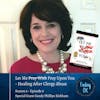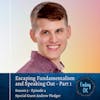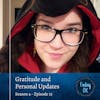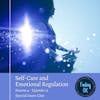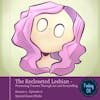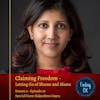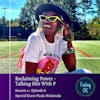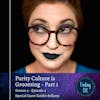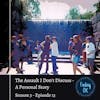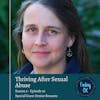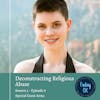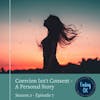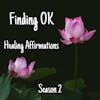Empowerment Through Activism
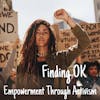
I talk about some of the ways activism can help shift the lens of our trauma and help us heal and feel more empowered. I share my experiences attending Take Back the Night marches, the way they helped transform the way I thought of anger, and the important way they helped me feel connection with other survivors.
Tw/Cw: Sexual assault, use of the word rape, PTSD, and brief mention of stalking, molestation, and abuse.
Take Back the Night Foundation
https://takebackthenight.org/
http://www.emmasulkowicz.com/
https://en.wikipedia.org/wiki/Emma_Sulkowicz
Real Human Better
https://www.facebook.com/Real-Human-Better-101628431484897
Hecate 0:00
Hi there. Thank you so much for joining me. I’m Hecate, and this is Finding OK, a healing podcast for survivors of sexual assault and abuse. Today I’d like to talk about empowerment and healing through activism. I’m going to share some of my own experiences with this. Ultimately, it’s these experiences that lead to the creation of this podcast, I hope hearing about them will be helpful, informative, and maybe even inspiring.
*Intro music by Ramshackle Glory* 0:30
*Drums, and then uplifting folk/punk chords on guitar* Dalia never showed me nothing but kindness. She would say: “I know how sad you get". And some days, I still get that way, But it gets better, it gets better, it gets better. Sweetie, it gets better, I promise you. And she'd tell me...[Chorus] Your heart is a muscle the size of your fist. Keep on loving, keep on fighting. And hold on, and hold on. Hold on for your life…*fade out as guitar chords play*
Hecate 1:26
Trigger and Content warnings for this episode include the following: sexual assault, use of the word rape, P.T.S.D., and brief mention of stalking, molestation, and abuse. Check in with yourself and make sure you’re all right to continue…ok.
Hecate 1:48
About fourteen years ago I was a freshman in college. I was 20 years old when I got there and I already had P.T.S.D. and a number of past traumas. I had just returned from half a year doing volunteer work abroad where I was molested by a monk and then stalked for three months. The last relationship I had before I left America lasted a year and ended when he sexually assaulted me.
Hecate 2:17
I had plenty of trauma that predated that relationship. Point being, I came with baggage. During that first year one of my roommates was date-raped by someone she trusted. That’s not my story to tell. But that event changed both our lives. It was traumatizing for her, and it was retraumatizing for me. Sharing a living space with someone who was so raw and in the middle of that painful event, made it inescapable. My experience with P.T.S.D. and sexual assault meant that I was able to be a more supportive friend.
Hecate 3:00
I know I probably didn’t do everything right, no one can, but we were lifelines to each other. Being present with her through that meant being present with my own trauma, and I started to realize my P.T.S.D. wasn’t truly being addressed or treated. I hadn’t been dealing with my own shit fully, and that dorm room was fucking intense. We all got therapy and help, but it really made me realize that outside of the official resources victims are directed to (if they’re given any resources at all) what makes the biggest difference is hearing from other people who have been where you are, who have shared experiences.
Hecate 3:49
As helpful as therapy is, most therapists don’t disclose whether or not they have personally experienced sexual assault or abuse. There’s a level of clinical disconnect, at least there was for me personally. I realized through this time with my roommate that I had quiet resentment being treated by people who hadn’t necessarily experienced anything like what I’d experienced. I couldn’t know that, but if they didn’t disclose it, it’s what I was left to assume - that they had studied what I was feeling in books. It made me feel more isolated.
Hecate 4:32
As painful and as messy as connecting and sharing with my roommate was, it helped us feel less alone. And that’s what the stigma surrounding sexual assault and abuse does, it isolates you. That stigma further traumatizes and damages people, and it perpetuates rape culture. My point is that connecting with another survivor changed my healing process for the better.
Hecate 5:03
My memory isn’t clear but I’m fairly sure that my roommate was the one to tell me about a protest and rally that was about to happen in our city. I’m pretty sure she’s the one that invited me to the annual Take Back the Night March that year. If you’re not familiar with Take Back the Night I’ll be linking them in the episode notes. Take Back the Night Foundation has its roots in activism dating back to the 70’s and the foundation was officially formed in 2001.
Hecate 5:36
They are dedicated to supporting survivors of sexual assault and abuse, and committed to activism that dismantles the systems that perpetuate it. They have a wide range of resources available to victims and they host events all over the world. I strongly encourage you to check them out. I had never heard of them. I had no idea what to expect from the march.
Hecate 6:02
I had participated in political activism growing up, but nothing ever tied to my trauma or my gender. This was before I came out as non-binary. The march took place after dark and hundreds of people came with signs and banners, and we marched together through the city’s main streets chanting. The idea being that we were taking back the night, a time that is often less safe for women, people of color, and Queer folk especially.
Hecate 6:36
I hadn’t done any research before I showed up to the march so that was really my revelation as I marched down these darkened city streets raising my voice. I felt empowered. I realized as I marched down those streets how unsafe I would normally feel if I walked down them alone at that hour.
Hecate 7:00
I realized as I raised my voice and shouted about my rights, how marginalized I was in certain ways, and how deeply conditioned I had been to sit down and keep quiet. It was an emotional experience. After the march concluded its pre-designated and approved route, we all convened at…it must have been a church? Or some other community building where refreshments were waiting, as was a microphone.
Hecate 7:37
There was an open mic. I spoke. I don’t remember anything I said that first year, but I identified myself as a survivor and shared. I don’t remember what I said because more than anything I remember what other people said.
Hecate 7:59
The most important part of that experience down the line was being in a room filled with people like me, who held the shared pain of taboo and horrifically common traumatic experiences. I heard other people’s stories. Women spoke. Men spoke. Queer and transgender people spoke. People of color spoke. Disabled people spoke.
Hecate 8:34
Some people who were allies got on mic to share their support I think, but I don’t remember, because I was so focused on this all important human connection, this spiritual communion that was occurring between the survivors in the room. We would listen, and hold the space for each other, support each other, and make room for this enormous part of our lives that so few people in our lives wanted to make room for.
Hecate 9:11
We spoke and we felt heard, and we listened and felt less alone with what we carried every day. I marched every year they held one while I lived in that city. I spoke again, more eloquently, *laugh* and one year I spoke about wanting to “feel ok again” about figuring out what the hell that looked like, and about the process of healing.
Hecate 9:43
I started with a metaphor. I said I was in a constant struggle to get my ducks in a row, and that sometimes it worked but that most of the time there was just poultry and feathers everywhere. I’m very expressive with my facial expressions and my gestures. I got a strong laugh, and I’ve never forgotten that laugh.
Hecate 10:08
People came up to me and told me how much they had identified with what I said and how much they appreciated me saying it real, but also saying it funny. I realized how important survivors laughing is, how empowering it is. Finding laughter again after trauma has been something really important, and it’s work I’ve only really been able to do directly with other survivors.
Hecate 10:39
It’s confusing and empowering healing. That deserves its own episode, humor post trauma. But I mention it because it was through activism that I connected with other survivors for the first time on such a scale. That experience also made me more confident to self-identify as a survivor in my daily life when the situation arose that I felt it should be done, that I felt it was both safe and important.
Hecate 11:14
Every time I identified in daily life in a group of people, someone always approached me afterwards to say, “me too”. Then I would sometimes see them getting more vocal. When we break the silence, when we’re brave or strong, we empower those around us.
Hecate 11:36
When we are truly ourselves, we give others the courage to be more truly themselves. It was through activism that I learned the importance of my dark humor, and it was also through activism that my perception of anger was changed.
Hecate 11:57
Marching through those streets, it was impossible not to ask the question, “Why is any of this necessary? Why shouldn’t I feel safe walking down these streets every night? Why the fuck is it like this?” I’ve been a Buddhist since I was thirteen years old, I’ve also been a practicing Pagan. Anger is a complex subject in Buddhism and it is generally demonized in the New Age community.
Hecate 12:32
In plenty of other spaces too the surface message is, *floaty mocking voice* “Anger is bad. Anger is never constructive. Anger in unevolved. Anger serves no purpose.” Bullshit. I call bullshit.
Hecate 12:58
Yes, this is a complex psychological and spiritual subject and I’m going to oversimplify it. This is a podcast episode and not a dissertation. Anger matters. Your anger matters. It’s natural and healthy and important for you to feel angry about what happened to you. You don’t have to feel it forever, but at some point in the healing process, most of us do have to feel and work with anger.
Hecate 13:35
Activism brought this home for me because when it was just me in my head, I was in a surface skimming, Zenned out head space of acceptance and forgiveness that I thought was where I needed to stay in order to be a good person, in order to be a spiritual person, in order to be a wise and evolved person.
Hecate 14:06
Your anger isn’t wrong. It doesn’t make you less, it doesn’t make you small or bad. One of my favorite Buddhist sayings about anger is this, “Holding on to anger is like grasping a hot coal with the intent of throwing it at someone else; you are the one who gets burned.”
Hecate 14:34
That is beautiful and true. *says brightly* Here’s how I misused and misunderstood that teaching! For years I clutched that teaching to my heart and refused to hold onto my anger. I refused to hold my anger. I refused to feel my anger. I repressed my anger.
Hecate 15:02
That’s not healthy, it’s not helpful, and it’s definitely not more evolved or more spiritual! You have to feel your anger. You have to hold it before you can choose not to hold onto it. Spiritual or emotional bypassing isn’t healthy for you, or anyone else. Growing up I had never really been taught how to deal with anger in a healthy way.
Hecate 15:34
My roots are Irish on one side, and mainly Swedish on the other side with a dash of English. The Irish side talks it to death, and the Swedish side buries it down deep and never talks about it again. I just wasn’t given those tools. I’m still learning. But anger in the face of injustice is important.
Hecate 16:02
It doesn’t have to be hatred, and we should do our best to keep it from morphing into that in my opinion. But when we look at the world and see oppression, injustice, and wrong being done and pardoned – part of challenging it is a fierce, righteous anger in your heart, one rooted in compassion and desire for change.
Hecate 16:34
There is an anger that says, “No. This is wrong. It should not be this way. This has to change.” It’s the anger that fiercely declares your human rights and autonomy, that lets you know that your boundaries have been violated and that you deserve better.
Hecate 17:01
There’s a kind of anger that is tied to your oppression, and needs to be reckoned with in order for you to truly believe that you deserve to be treated with respect, and to exist and take up space in the world. There’s a kind of anger that must be felt in order for you to learn to love yourself. It needs to be felt, and there needs to be space for it.
Hecate 17:32
Once it wasn’t just me. Once it was my roommate, my friends, and this community room packed with people, this mic stand before a seemingly endless procession of deep, secret, shared trauma, once it was a long city street filled with hundreds and hundreds of raised voices joining with mine – that’s when I fully felt my anger.
Hecate 18:04
That’s when I allowed myself to feel anger and began to realize that it wasn’t wrong, it was necessary and natural. It was important and beautiful. Now, I’m not saying anger is the gift that activism gives to everyone, “Get out there! You’ll be furious!”
Hecate 18:30
What I just shared was a specific transformative experience and I’m using it as an example of the way that activism shifts the lens of our experience. Trauma can often shift the focus inward. We curl up with it and we curl around it as we struggle to cope and reshape ourselves. It’s a painful process to try to relate to it, learn how to carry it, and it feels like something we always have to carry alone.
Hecate 19:05
I’m reminded of a performance art piece that an artist named Emma Sulkowicz did while she was a visual arts student at Columbia University. Her first day on campus she was raped on her dorm bed and she decided that she would carry her mattress everywhere with her on campus until either her rapist left the school or till her graduation.
Hecate 19:31
The title of the piece was “Carry That Weight” and it was incredibly powerful and inspiring to me. It showed the incredible strength of vulnerability. The rules of her piece were that she could not accept help carrying the mattress, but that others were allowed to offer to help. That resonates. That’s how it is. No one can carry it for you, but they can offer.
Hecate 20:03
When they offer, it helps a little. When you’re among others carrying their own weight, it changes things. I won’t say it makes the weight lighter, that may or may not be your experience. But it can change the weight, or give you strength. Connecting with others and getting involved in some way can help you give meaning to what happened.
Hecate 20:30
It is your personal journey to discover what meaning your trauma has, if any. When I attended Take Back the Night it helped me begin to shift my trauma. Instead of curling up with it, I began to do the painful work of integrating and processing it. *says with bright humor* (That story will be another episode most likely titled “Catharsis”)
Hecate 20:56
A part of processing what had happened to me was understanding that as alone as it made me feel, I wasn’t alone, that my trauma was one story among billions throughout history and that’s not ok. It shifted my focus and helped me start to understand and have experience of my trauma in a wider context. Activism isn’t just about creating change within the world around us, it’s about creating change within us.
Hecate 21:31
Everything is connected and you cannot have one without the other. Everyone’s activism is different, it takes many forms. I post a lot of articles on my Facebook page on ways to contribute if you’re disabled or can’t protest or march. I wouldn’t necessarily call myself an activist. I would hesitate because I am so blessed to know so many amazing people doing incredible work in their communities and the world.
Hecate 22:02
I’m inspired by them, but I recognize that my strengths are different from theirs and my abilities are different from theirs. It’s been hard not being out there right now at the marches. It’s where I want to be. But I dug deep and had to recognize that for a number of reasons, it wasn’t a good idea. I would be a liability. That doesn’t mean that I disconnect or that I don’t matter, it means I have to do other work.
Hecate 22:33
Find the work that you can do. Find the work that you can do without draining yourself of all your resources. By healing yourself, and taking care of yourself, you can do more continuous good in your community and in the world for a longer period of time. Manage your personal resources so that you can share your personal resources. That might not be where you are right now and that’s ok.
Hecate 23:04
I want to be mindful that everyone listening is in a different place in their healing process. For me, this podcast is part of my activism. In this episode I simply wanted to offer this personal experience in case it’s helpful to you. Connecting with others post trauma is incredibly difficult and it’s your choice when, how, and if you do that.
Hecate 23:31
It’s your choice whether you ever tell anyone. I just wanted to tell you a bit about how I started to connect with others, and some of the ways it helped and changed me. Empowerment is different for everyone, there are as many different forms of empowerment as there are individuals. But a very basic one is this: If something bad has happened to you, you can take action in the world to help make sure others don’t have to experience what you did.
Hecate 24:06
The core of that is the belief that your actions matter, that you have autonomy, and that your actions can make a difference. That is true. Whoever you are, you are worthwhile. Whoever you are, you are worthwhile.
Hecate 24:33
You do make a difference in this world every day that you’re alive and on this planet. Activism asks you to be a mindful participant in that process, to direct your impact. Post trauma activism is a whole kettle of fish, there’s a lot to unpack there and hopefully I’ll have some people on to have some great conversations and help me do that.
Hecate 25:03
But this is me broaching the subject more directly. I’m going to direct you to something called Real Human Better. There’s a link in the episode notes. A friend of mine is doing some sensational work right now that’s just next level. It gathers all the intersecting threads and weaves them together in a way that my brain really struggles with, thus, I’m blown away by the organization.
Hecate 25:31
The project is called Real Human Better. You can find it on Facebook. It’s run by Eliot, she posts weekly Facebook live and zoom classes on Social Permaculture. That’s a loaded phrase there that takes some explanation and I’m not the best one to do it. Hopefully I can get Eliot to join me someday and talk a bit about it. But it’s utilizing available tools, techniques, and resources in a regenerative way in your environment.
Hecate 26:06
While permaculture is a landscaping and gardening term, “Social Permaculture” is using the same ideas and applying them to all areas of human life. It’s astoundingly comprehensive and every video I watch is filled with resources and ways to just be a better human being. She hits every aspect of being a person and gives you tools and resources to grow and evolve in a healthy way.
Hecate 26:38
You can find the link in episode notes, check it out. Thank you so much for listening. Please write in with listener questions and episode requests to podcast.findingok@gmail.com. Let me know if you’re interested in joining me on the show. Finding OK is entirely crows funded and you are the ones helping me make this happen.
Hecate 27:04
Thank you, truly, thank you. A link to the Go Fund Me can be found on the podcast website and I post links routinely on my Facebook page. I also post relevant articles, art, memes, and resources daily. Feel free to friend me. Hecate F. Okay *spells name* You can also find me on Instagram. Thank you so much for your continued support. Please share, subscribe, and donate if you can. Thank you again for listening. This has been Finding OK. Black Lives Matter. Take care of yourself.
*Outro music by Ramshackle Glory* 27:47
*fade in to folk/punk chords of guitar* Your heart is a muscle the size of your fist. Keep on loving. Keep on fighting. And hold on, and hold on, hold on for your life *echoes into brief silence*…(Chorus and full band) Your heart is a muscle the size of your fist. Keep on loving. Keep on fighting. And hold on, and hold on, hold on for your life. *triumphant and uplifting music plays till end*
















